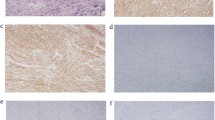Abstract
Most gastrointestinal stromal tumors (GISTs) are associated with activating kinase mutation in KIT or platelet-derived growth factor receptor alpha (PDGFRA) gene, and imatinib has revolutionized the care of advanced GISTs. However, most patients gradually developed resistance to imatinib. We intend to identify the secondary kinase mutations in imatinib-resistant GISTs and to study the relationship between secondary kinase mutations and the clinical response to imatinib. Twelve advanced GIST patients, who have developed resistance to imatinib were included in this study. Paraffin-embedded pretreatment GIST specimens and progression lesions of the tumors after resistance to imatinib were analyzed for kinase mutations in exons 9, 11, 13, and 17 of KIT gene and exons of 10, 12, 14, and 18 of PDGFRA gene. Primary KIT mutations have been found in all but one of the primary tumors including one case harboring de novo double KIT exon 11 mutations. Secondary kinase mutations in KIT and PDGFRA were found in seven and 1 of 12 patients, respectively. Two patients harbored more than one secondary KIT mutations in different progression sites, and there are four types of clonal or polyclonal evolution being observed. The secondary PDGFRA exon 14 mutation H687Y is a novel mutation that has never been reported before. Acquired secondary kinase mutations are the most important cause of secondary imatinib resistance in advanced GISTs. The identification of secondary kinase mutations is important in the development of new therapeutic strategies.

Similar content being viewed by others
References
Hirota S, et al. Gain-of-function mutations of c-kit in human gastrointestinal stromal tumors. Science 1998;279:577–80.
Heinrich MC, et al. PDGFRA activating mutations in gastrointestinal stromal tumors. Science 2003;299:708–10.
Nilsson B, et al. Gastrointestinal stromal tumors: the incidence, prevalence, clinical course, and prognostication in the preimatinib mesylate era—a population-based study in western Sweden. Cancer 2005;103:821–9.
Tryggvason G, Gislason HG, Magnusson MK, Jonasson JG. Gastrointestinal stromal tumors in Iceland, 1990–2003: the icelandic GIST study, a population-based incidence and pathologic risk stratification study. Int J Cancer 2005;117:289–93.
Tzen CY, et al. Incidence of gastrointestinal stromal tumor: a retrospective study based on immunohistochemical and mutational analyses. Dig Dis Sci 2007;52:792–7.
Lin SC, et al. Clinical manifestations and prognostic factors in patients with gastrointestinal stromal tumors. World J Gastroenterol 2003;9:2809–12.
Demetri GD, et al. Efficacy and safety of imatinib mesylate in advanced gastrointestinal stromal tumors. N Engl J Med 2002;347:472–80.
Chen LL, et al. A missense mutation in KIT kinase domain 1 correlates with imatinib resistance in gastrointestinal stromal tumors. Cancer Res 2004;64:5913–9.
Tamborini E, et al. A new mutation in the KIT ATP pocket causes acquired resistance to imatinib in a gastrointestinal stromal tumor patient. Gastroenterology 2004;127:294–9.
Wakai T, et al. Late resistance to imatinib therapy in a metastatic gastrointestinal stromal tumour is associated with a second KIT mutation. Br J Cancer 2004;90:2059–61.
Antonescu CR, et al. Acquired resistance to imatinib in gastrointestinal stromal tumor occurs through secondary gene mutation. Clin Cancer Res 2005;11:4182–90.
Debiec-Rychter M, et al. Mechanisms of resistance to imatinib mesylate in gastrointestinal stromal tumors and activity of the PKC412 inhibitor against imatinib-resistant mutants. Gastroenterology 2005;128:270–9.
Tamborini E, et al. KIT/Val654 Ala receptor detected in one imatinib-resistant GIST patient. Cancer Res 2005;65:1115 (author reply 1115).
Wardelmann E, et al. Acquired resistance to imatinib in gastrointestinal stromal tumours caused by multiple KIT mutations. Lancet Oncol 2005;6:249–51.
Grimpen F, et al. Resistance to imatinib, low-grade FDG-avidity on PET, and acquired KIT exon 17 mutation in gastrointestinal stromal tumour. Lancet Oncol 2005;6:724–7.
McLean SR, et al. Imatinib binding and cKIT inhibition is abrogated by the cKIT kinase domain I missense mutation Val654Ala. Mol Cancer Ther 2005;4:2008–15.
Wardelmann E, et al. Polyclonal evolution of multiple secondary KIT mutations in gastrointestinal stromal tumors under treatment with imatinib mesylate. Clin Cancer Res 2006;12:1743–9.
Heinrich MC, et al. Molecular correlates of imatinib resistance in gastrointestinal stromal tumors. J Clin Oncol 2006;24:4764–74.
Miettinen M, et al. Gastrointestinal stromal tumors, intramural leiomyomas, and leiomyosarcomas in the duodenum: a clinicopathologic, immunohistochemical, and molecular genetic study of 167 cases. Am J Surg Pathol 2003;27:625–41.
Heinrich MC, et al. Sunitinib (SU) response in imatinib-resistant (IM-R) GIST correlates with KIT and PDGFRA mutation status. J Clin Oncol 2006;24(Suppl 18):9502.
Corless CL, et al. PDGFRA mutations in gastrointestinal stromal tumors: frequency, spectrum and in vitro sensitivity to imatinib. J Clin Oncol 2005;23:5357–64.
Corless CL, Fletcher JA, Heinrich MC. Biology of gastrointestinal stromal tumors. J Clin Oncol 2004;22:3813–25.
Demetri GD, et al. Efficacy and safety of sunitinib in patients with advanced gastrointestinal stromal tumour after failure of imatinib: a randomised controlled trial. Lancet 2006;368:1329–38.
Acknowledgment
This study is supported in part by grant from Mackay Good Neighborhood Foundation.
Author information
Authors and Affiliations
Corresponding author
Rights and permissions
About this article
Cite this article
Lim, KH., Huang, MJ., Chen, LT. et al. Molecular analysis of secondary kinase mutations in imatinib-resistant gastrointestinal stromal tumors. Med Oncol 25, 207–213 (2008). https://doi.org/10.1007/s12032-007-9014-2
Received:
Accepted:
Published:
Issue Date:
DOI: https://doi.org/10.1007/s12032-007-9014-2




